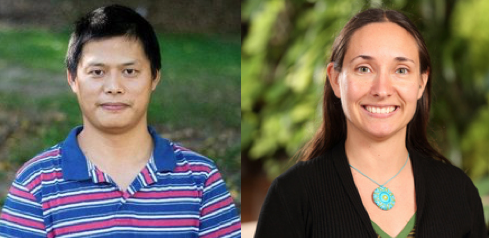
Dr Hong Peng and Dr Elisa Bayraktarov.
Three research papers published in the last few months, covering biology, ecology and molecular chemistry, acknowledge the assistance of RCC’s expertise and resources.
A collaborative paper involving researchers in Queensland, Sydney and Papua New Guinea, on the cross-border movement of a highly drug-resistant strain of tuberculosis, acknowledged the help of RCC cloud computing systems administrator Derek Benson with data analysis, and the use of QRIScloud, the Queensland node of the Nectar Research Cloud jointly operated by RCC and QCIF.
Derek’s assistance, described in the paper as “gratefully acknowledged”, involved script writing in programming languages Python and Bash, installing tools on the Galaxy Australia workflow engine, debugging software and referring back to developers for fixes.
The lead author of the paper, published in the March issue of the Emerging Infectious Diseases journal, is Dr Arnold Bainomugisa, a research scientist at the University of Queensland and a part-time scientist at the Queensland Mycobacterium Reference Laboratory, a World Health Organization collaborating centre in Brisbane.
Another paper involving a national and international collaboration that acknowledged RCC, is one published in the Frontiers in Ecology and Evolution journal on 24 January.
“Do Big Unstructured Biodiversity Data Mean More Knowledge?”, by authors from Queensland, Melbourne, Canberra, London and Virginia, USA, acknowledged the use of QRIScloud computing infrastructure and associated expertise to perform data analysis.
The paper (UQ’s Dr Elisa Bayraktarov is the lead author) concludes “with a call for action for researchers, managers and decision-makers alike to support long-term data collection and not to confuse data quantity with data quality. We propose a new research agenda that tests the utility of big unstructured data benchmarked against long-term high-quality datasets.”
RCC’s Dr Hoang Nguyen and Dr Siddeswara Guru of RCC and TERN worked closely with Dr Bayraktarov, and other members of the Threatened Species Recovery Hub, of the Australian Government’s National Environmental Science Program, to develop a scientific workflow for the Threatened Species Index (TSX) project, which the paper is based on. (A case study about this work can be read on RCC’s website.)
The TSX is initially focusing on Australian birds. Sub-contracted by the bird data host, BirdLife Australia, the QRIScloud node is also providing server space for the project database and website used for development.
Australia’s TSX is based on the Living Planet Index (LPI), developed in 1998 by the Zoological Society of London and the World Wide Fund for Nature (WWF).
Published very recently, a UQ molecular chemistry manuscript acknowledges the allocation of time on RCC-managed HPC Tinaroo and RCC co-managed (with QCIF) HPC Awoonga.
The manuscript’s lead author, Dr Hong Peng from UQ’s School of Chemical Engineering, and his project team, received help from RCC HPC Manager Dr David Green with their usage of Tinaroo and Awoonga.
The manuscript was published online on Friday, 15 March, on ScienceDirect and will be published as a paper in the June issue of the Journal of Molecular Liquids.
This will be the third paper published based on Dr Peng and his team’s work, with two papers published last year, both of which also acknowledged the use of UQ’s HPC resources. The first two papers were about the project’s early-stage work. The most recent manuscript summarises the project’s key findings.
Dr Peng’s project focuses on the early stages of nucleation phenomena from nanobubble to salt crystallisation. His research aims to reveal the nucleation mystery at atomic scale through in situ facilities and molecular dynamics simulation to gain an understanding of how to manipulate the crystallisation process, which is critical to hydrometallurgy and chemical engineering processes.
In the near future, Dr Peng and his team will use molecular dynamics simulation to investigate the nucleation and crystallisation of cobalt and nickel sulfate (which are key battery materials) in solution.
Researchers who wish to discuss how RCC can help their research may contact the RCC Support Desk: rcc-support@uq.edu.au.



